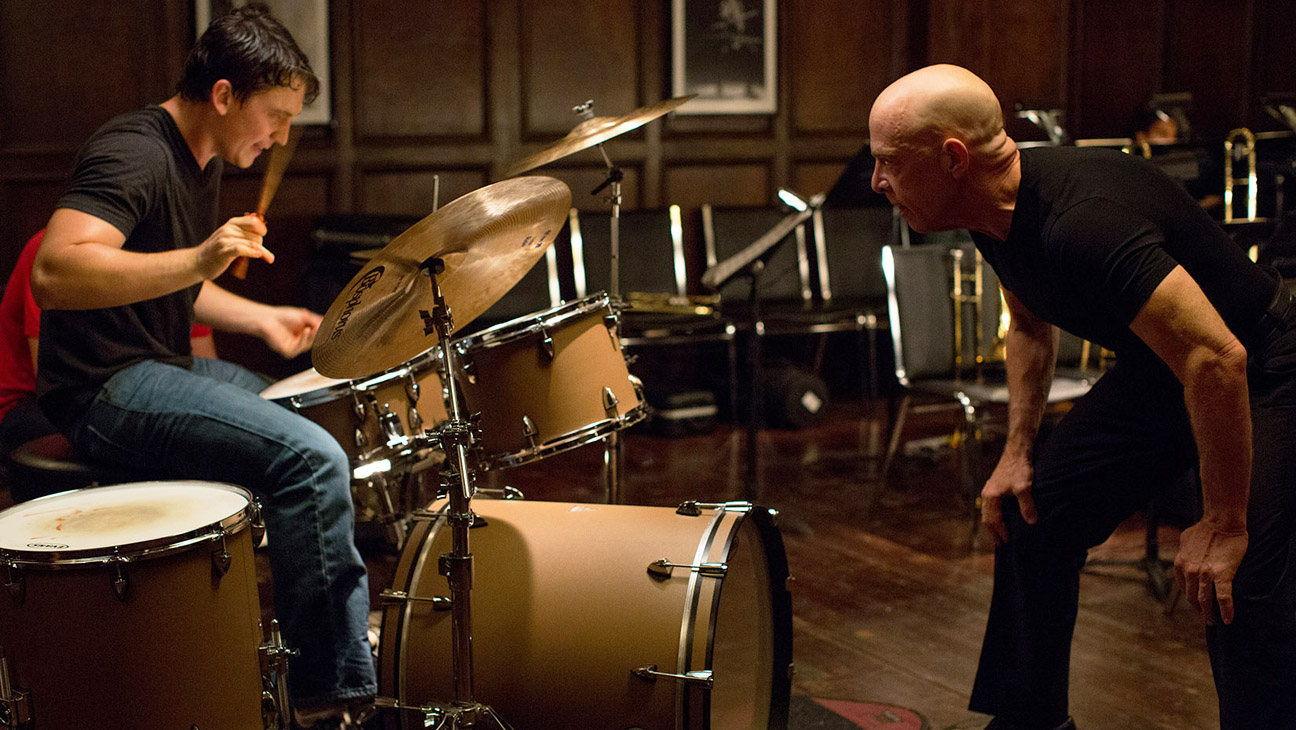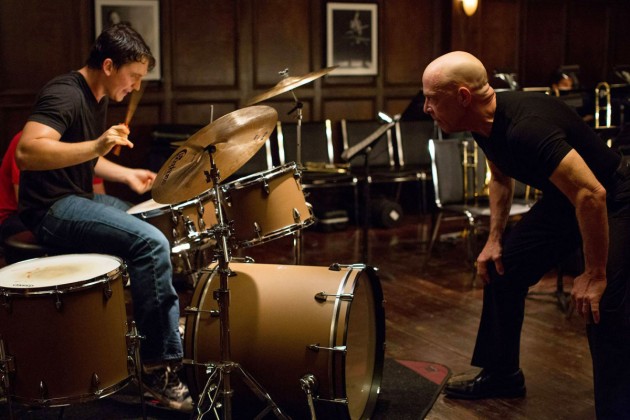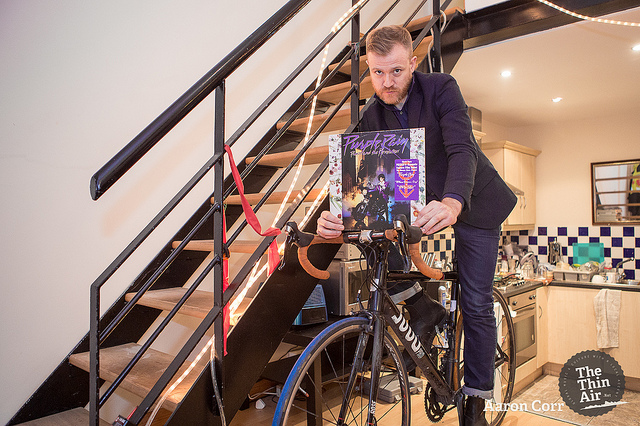Damien Chazelle’s testosterone-pumping Whiplash, released last month, is a musical coming-of-age story with the form of a boxing movie; never more so than in a pivotal ‘training montage’ in which the young hero, the talented but arrogant jazz drummer Andrew Neyman (Miles Teller), works to regain his lost first-stringer position. In a move obviously designed to provoke the music student, band conductor Terence Fletcher (J.K. Simmons), who rules his classroom with equal parts terror and humiliation, has replaced the ambitious Andrew with a drummer of lesser ability. Andrew channels his frustration and rage into a gruelling, cymbal-smashing practice session, applying bandage after bandage as his hand chafes and bleeds from the drum sticks. We get close-ups of bloody equipment as he screams and sweats, like Rocky pounding frozen beef. If he wants to be a contender, he’s gotta bleed. When Andrew returns to the ring the suffering only intensifies: he and two other candidates are borderline-tortured by Fletcher, forced to keep his demanding tempo until they can barely sit up. An exhausted Andrew gets the gig. ‘You earned it’ says Fletcher, not so much a thumbs-up as a grim acknowledgement of achievement bought through suffering. No pain, no gain.
Whiplash is at its cruel best when it savages the glib ‘inspirational mentor’ tropes of films like Dead Poets Society and School of Rock, and the in-vogue cultural emphasis on self-belief, inclusivity and your best being good enough. In the Guardian, Catherine Shoard bracketed it within a larger ‘backlash to the progressive liberalism of the 60s and 70s’. On Andrew’s first morning, Fletcher pulls him aside for a pep-talk, reminding him that he’s ‘here for a reason’. In the next scene he flings a chair at him. Fletcher doesn’t care if you ‘believe in yourself’ or if, like a teary Simon Cowell reject, you ‘really want this’. Your feelings are irrelevant. All he cares about is the beat, and whether or not you have the discipline and commitment to keep it. If you can’t, you’re out. Sorry. This is a hug-free zone.
Fletcher sees his methods as vital to the formation of great artists and, by extension, great art. As he explains to Andrew, he pushes his students to achieve excellence, or at least a standard of technical competency that would’ve been impossible on their own. He views the proliferation of ‘Starbucks jazz’ as evidence of widespread musical mollycoddling; a generation of artists who were fed easy praise by their parents, teacher and peers and coasted on ‘good enough’. To achieve higher things you have to propel yourself beyond your boundaries, into the new, the uncomfortable and the painful. As Whiplash complicates its head-butting central antagonism in the final act, the pettiness and sadism behind Fletcher’s self-described selflessness bubbles to the surface, introducing notes of discord to his ‘I hurt to help’ defence. But in the edge-of-your-seat finale, the hot coals of Andrew’s fuck-you fury and self-punishment power a thrilling improv drum solo, as abuser and victim fall into collaboration, joint midwives of a towering musical performance.
Another recent film that pushes an unfashionable musical elitism by subverting genre expectations is last year’s deceptively quirky Frank, directed by Lenny Abrahamson and inspired by screenwriter Jon Ronson’s experiences as a keyboardist for Frank Sidebottom, the comic persona of Chris Sievey. Ronson stand-in Jon (Domhnall Gleeson) is a young, bored songwriter who gets drafted to play keyboards for the experimental and unpronounceable outfit The Soronprfbs. Frank (Michael Fassbender) is their delicate and visionary frontman, prone to intense highs and lows and permanently enclosed within a bizarre papier-mâché head. Like Andrew, Jon is a naïve outsider in a new and strange musical environment, all ginger and affable like an Ed Sheeran.
His cute little melodies fail to impress his new bandmates, particularly the temperamental thereminist Clara (Maggie Gyllenhaal), who views his tweeness and commercial instincts with barely-disguised disgust. The band retreat to a secluded cabin to compose their new album, a process of perfectionism and out-there methods Jon secretly documents via blog posts and Youtube videos. For Jon, this is his Journey To Musical Credibility as he grows a beard and joins in with Frank’s unorthodox methods, but the film continually undercuts his pretensions. He bursts in on the band manager Don, a depressive with a fetish for blow-up dolls, to show off his new song, but all he can muster is a feeble ‘la-la-la-la’ nursery-rhyme.
When Jon reveals their invite to play the South by Southwest festival in Texas, spurred by the online buzz he’s been generated, he promises the nervous Frank and eager and appreciative audience for his talent. But it does not go well, and in the third act the film takes a turn towards honesty. As any vaguely in-touch Youtuber could have told Jon, a couple of thousand views does not a dedicated fanbase make. Jon convinces Frank to rein his sound in and make it more accessible and crowd-pleasing to the audience that has shown up and the other band members quit in protest, leaving the two of them to do an Unplugged session alone. When an over-enthused Jon launches into one of his insufferable little ditties, Frank collapses in a kind of physical reaction to the song’s shitness. Jon is forced to recognise the truth about his limited songwriting abilities and his misguided influence on Frank.
In some ways, Frank is actually more cynical than Whiplash in its attitude towards musical talent. Andrew has strong natural gifts for the drums, but the film emphasizes actionable qualities like discipline and repetition. On the other hand, even with Malcolm Gladwell’s ten thousand hours, Jon will probably always be mediocre. As Don explains to him, he’s going to eventually think he can be Frank – but that is a delusion. Only Frank can be Frank. The talent of genius is unlearned and intuitive, like a feeling or an instinct, granted by some random lottery of birth.
For a frustrated suburban boy like Jon, Frank is like an exotic animal. When he is told about Frank’s difficult childhood, from which his mental unorthodoxy apparently springs, he expresses something similar to jealousy. If only I could’ve had a fucked-up life he wishes silently. Then I could be all Damaged and Brilliant. Like every wistful young person intoxicated with spectacular artists and their spectacular hidden turmoil, he curses the soft comfort of his lower middle-class background. But when he finally tracks an errant Frank to his childhood home, he finds a house and a set of parents uncomfortably similar to his own. When Frank’s mother and father – exuding a homey, kind-hearted decency – explain the origins of the makeshift head, Jon comments that at least his mental illness helped him access a stunning creativity, a theory the couple reject immediately. He was always talented – ‘If anything, the illness slowed him down’. The suffering got in the way.
Jon has bought into music culture’s mythology of mental illness, where handicaps and inner distress are glamourized as confirmations of emotional realness. As ever, the people who reap the supposed benefits of depression and other forms of emotional suffering are not the ones who experience it. That is left to the freaks who, like the prophets of old, burrow into their madness and retrieve secret pearls fenced off from the rest of us; the artistic equivalent of capitalism’s sweatshop workers. In Frank’s magnificent final scene the frontman reunites with his band, with the stitched cranium and thousand-yard stare of a Cuckoo’s Nest patient, and they jam out to the sad and euphoric off-the-cuff ballad ‘I Love You All’. Inspiration, it seems, can spring from noble things too. Conor Smyth







